Eerdmans Orthodox Spirituality and Faith Collection (10 vols.)
Digital Logos Edition
Overview
Explore Orthodox theology with the writings of well-known theologians such as Sergius Bulgakov. Known as the twentieth century’s greatest Orthodox theologian, Bulgakov’s writings, and those of others in this collection, illuminate the beauty of Orthodox thought and tradition. Expertly translated into English—many for the first time—these volumes beckon readers into the exquisite intimacy with God that is characteristic of Bulgakov’s work. You’ll also experience the longing of S.L. Frank’s The Meaning of Life, renowned as the Book of Job for the twenty-first century, and contemplate God and nature with Vigen Guroian’s The Fragrance of God.
Want an even better deal? Get more books at a bigger discount when you order the Eerdmans Bible Reference Bundle 2!
You may also be interested in Christian Iconography: The History of Christian Art in the Middle Ages (2 vols.).

- Features the work of the greatest Orthodox theologian of the twentieth century
- Presents expert English translations
- Offers insights into Orthodox theology
- Title: Eerdmans Orthodox Spirituality and Faith Collection
- Publisher: Eerdmans
- Volumes: 10
- Pages: 2,980
- Christian Group: Orthodox
- Resource Type: Topical
- Topic: Eastern Orthodoxy
Individual Titles
- Icons and the Name of God by Sergius Bulgakov
- Jacob’s Ladder: On Angels by Sergius Bulgakov
- The Meaning of Life by S.L. Frank
- The Burning Bush: On the Orthodox Veneration of the Mother of God by Sergius Bulgakov
- Churchly Joy: Orthodox Devotions for the Church Year by Sergius Bulgakov
- The Lamb of God by Sergius Bulgakov
- The Fragrance of God by Vigen Guroian
- The Justification of the Good: An Essay on Moral Philosophy by Vladimir Solovyov
- The Comforter by Sergius Bulgakov
- The Bride of the Lamb by Sergius Bulgakov
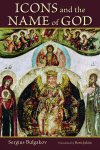
In Orthodox theology both the icon and the name of God transmit divine energies, theophanies, or revelations that imprint God’s image within us. In Icons and the Name of God renowned Orthodox theologian Sergius Bulgakov explains the theology behind the Orthodox veneration of icons and the glorification of the name of God. In the process Bulgakov covers two major controversies—the iconoclastic controversy (sixth to eighth centuries) and the “Name of God” controversy (early twentieth century)—and explains his belief that an icon stops being merely a religious painting and becomes sacred when it is named. This translation of two essays “The Icon and Its Veneration” and “The Name of God”—available in English for the first time—makes Bulgakov’s rich thinking on these key theological concepts available to a wider audience than ever before.
The great tragedy of contemporary Orthodox theology is that Sergius Bulgakov remains one of the most understudied and underappreciated Orthodox theologians of the twentieth century. . . . In true Bulgakovian fashion, Icons and the Name of God does not simply describe what the icon is, but how the icon is possible—the presencing of the divine in and through the material form. Like no other contemporary Orthodox theologian, Bulgakov engages the patristic tradition in a critically appreciative manner toward rendering an understanding of the icon that responds to contemporary questions. No serious Orthodox theology of the icon can ignore this magnificent text.
—Aristotle Papanikolaou, Archbishop Demetrios Professor in Orthodox Theology and Culture, Fordham University
Boris Jakim has done English readers an inestimable service with his translations of the major works of twentieth-century Russian religious philosophy and theology—works by S. L. Frank, Pavel Florensky, Vladimir Solovyov, and Sergius Bulgakov. In the present book he adds translations of two shorter works by Bulgakov on the veneration of icons and of the name of God in Orthodox tradition. Bulgakov’s full and penetrating thought about these much-contested subjects is the more striking for the brevity of its expression.
—Richard Pevear, adjunct, American University of Paris
Inspired by the Orthodox understanding of the Incarnation, Bulgakov’s comprehensive vision of the Word made flesh is on full display here, thanks not only to the great theologian himself but also to his gifted and tireless translator, Boris Jakim.
—Paul Valliere, professor of religion, Butler University
Sergius Bulgakov (1871–1944) is widely regarded as the twentieth century’s leading Orthodox theologian. His books include Relics and Miracles, The Unfading Light, The Burning Bush, The Lamb of God, The Comforter, Jacob’s Ladder, and Churchly Joy.
Boris Jakim is the foremost translator of Russian religious thought into English. His published translations include works by S.L. Frank, Pavel Florensky, Vladimir Solovyov, and Sergius Bulgakov.
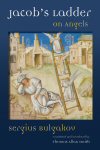
Few of the great Russian author Sergius Bulgakov’s writings achieve the lyrical heights of Jacob’s Ladder. In this book, originally published in 1929, Bulgakov explores the doctrine of angels and their importance for contemporary humanity. He frames his work with meditations on the meaning of love, not as a sentimental indulgence, but as a way of understanding the deep, tender, self-sacrificing, personal knowledge that is both at the heart of a Trinitarian God and in the midst of relationships between human beings and their guardian angels. These discussions on the creation, function, nature, appearances and incorporeality of angels lead also to reflections on the incarnation and human nature, especially the role of the sexes, death, and the Christian hope of resurrection.
Jacob’s Ladder completes the development of Divine Sophia—on the Wisdom of God in creation—begun in The Burning Bush and The Friend of the Bridegroom, which together constitute Bulgakov’s first dogmatic trilogy.
Written by Bulgakov after a near-death encounter with an angelic being who led him back to life, Jacob’s Ladder possesses a mystical intensity almost beyond words. Using doctrinal, scriptural, liturgical, iconographic, and personal experiential data, Bulgakov provides a theological interpretation of the doctrine of angels. Its lyrical beauty and its profound speculative reflections make this book very difficult to translate, but Thomas Allan Smith has more than met the challenge, offering English-speaking readers what is undoubtedly the greatest work of angelology in the modern Orthodox literature.
—Boris Jakim, translator
Bulgakov masterfully intertwines the multistranded Christian tradition into not simply a tract on angels but, more importantly, a profound and beautiful rhapsody on divine love as manifested in both the angelic and the human realm. This is not a simple book about angels but, rather, a radiant and hope-filled symphony beginning with words of love—‘God-Love created human beings for love’—and culminating in joy: ‘How great is the joy bestowed on humankind knowing this!’ No small recognition is owed Thomas Allan Smith for working a difficult Russian text into a flowing and enjoyably readable English translation.
—Myroslaw Tataryn, professor of religious studies, St. Jerome’s University
Sergius Bulgakov (1871–1944) is widely regarded as the twentieth century’s leading Orthodox theologian. His books include Relics and Miracles, The Unfading Light, The Burning Bush, The Lamb of God, The Comforter, Jacob’s Ladder, and Churchly Joy.
Thomas Allan Smith has translated multiple works by Sergius Bulgakov.
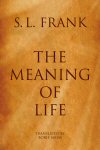
Originally published in Russian in 1925, The Meaning of Life is a distillation of S.L. Frank’s bitter experience during the Revolution and his post-Revolution exile. It is, quite simply, a book about the search for meaning in suffering, and it displays an extraordinary spiritual profundity rooted in personal experience. Translator Boris Jakim calls it “the closest thing we have in the twenty-first century to the book of Job.” Jakim’s masterful translation into English brings Frank’s powerful thought to a world still—and always—searching for meaning.
Boris Jakim has done us a great service in making available one of Semyon Frank’s most accessible writings. One of Russia’s greatest philosophers, Frank wrote The Meaning of Life shortly after his exile from Russia in 1922, when Lenin forced many of Russia’s leading thinkers to leave the country. An appealing mix of reflection and argument, a meditation on the deepest questions of life.
—Philip Boobbyer, deputy head, school of history, University of Kent
This soulful essay is the perfect introduction to the philosophical and religious thought of S.L. Frank . . . Here Frank calls us to a sense of the whole of things, an intuition of Eternal Being, to what Vladimir Solovyov called ‘a wholly joyous secret—God is with us.’
—Paul Valliere, professor of religion, Butler University
S.L. Frank (1877–1950) was one of the most outstanding Russian philosophers of the modern era. An early theoretical opponent of Marxism and Soviet communism, he was a leading figure of the Russian religious renaissance in the early twentieth century.
Boris Jakim is the foremost translator of Russian religious thought into English. His published translations include works by S.L. Frank, Pavel Florensky, Vladimir Solovyov, and Sergius Bulgakov.
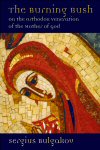
In The Burning Bush—the first component of his “minor theological trilogy”—the great Russian Orthodox theologian Sergius Bulgakov explores the place of Mary the Mother of God in Orthodox theology and devotional practice, in the process critiquing certain aspects of Roman Catholic Mariology. Drawing heavily on the Orthodox Church’s liturgical texts and iconography and on his own developing Sophiology, Bulgakov offers a rich explanation of the unique, mysterious role played by the Mother of God as the realization of the human capacity for divinization.
In this book, unique in the Russian Orthodox literature, the great theologian Sergius Bulgakov illuminates various aspects of the Church’s veneration of the Mother of God. Like all of Bulgakov’s devotional books, this is not a work of abstract theologizing, but a work of prayer, opening up a vision of the mystical reality that forms the foundation of our relations to the Ever-Virgin and her relation to us. Thomas Allan Smith’s translation is superb, and in his first-rate introduction he does an excellent job of elucidating Bulgakov’s sophiological approach.
—Boris Jakim, translator
Thomas Allan Smith and Eerdmans deserve an immense debt of gratitude for providing a long-awaited English translation of this pivotal work of the leading Russian Orthodox theologian of the twentieth century. Even more, Smith’s translation is careful, nuanced, and yet preeminently readable . . . Western Christians and non-Christians alike often see Orthodoxy as a fascinating, exotic, and mysterious form of Christianity. The Burning Bush, in Smith’s translation, helps the reader recognize both Orthodoxy’s inner coherence and rationality and its rootedness in a profoundly sublime appreciation of creation’s beauty and magnificence . . . Smith’s list of Bulgakov’s sources is a simple yet indispensable tool for the scholarly reader. This translation will serve us all well for decades to come.
—Myroslaw Tataryn, professor of religious studies, St. Jerome’s University
Sergius Bulgakov (1871–1944) is widely regarded as the twentieth century’s leading Orthodox theologian. His books include Relics and Miracles, The Unfading Light, The Burning Bush, The Lamb of God, The Comforter, Jacob’s Ladder, and Churchly Joy.
Thomas Allan Smith has translated multiple works by Sergius Bulgakov.
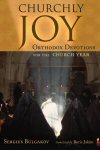
This distinctive book contains spiritual orations and edifying discourses rooted in the Orthodox tradition. In Churchly Joy Sergius Bulgakov takes readers through the joyous mysteries of the church year as reflected in the Orthodox Church’s major feasts, including celebrations of the Annunciation, the Birth of Christ, the Epiphany, the Transfiguration, the Triumphal Entry, Easter, and more. Churchly Joy reflects Bulgakov’s transcendent vision for the church and will provide spiritual growth and edification for all Christians.
These magnificent homilies are not just richly scriptural. The poetry of Orthodox hymnody runs through them, and they are companionate with the great festal iconography of the Church. We are fortunate that Sergius Bulgakov distilled the profound theological insights of his great works into these illuminating orations that will inspire Christians in all walks of life.
—Vigen Guroian, author, The Fragrance of God
Sergius Bulgakov (1871–1944) is widely regarded as the twentieth century’s leading Orthodox theologian. His books include Relics and Miracles, The Unfading Light, The Burning Bush, The Lamb of God, The Comforter, Jacob’s Ladder, and Churchly Joy.
Boris Jakim is the foremost translator of Russian religious thought into English. His published translations include works by S.L. Frank, Pavel Florensky, Vladimir Solovyov, and Sergius Bulgakov.
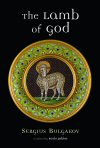
What is our participation in the divine humanity? In explaining this important doctrine, Sergius Bulgakov begins by surveying the field of Christology with special reference to the divine humanity. He considers the role of the Divine Sophia, examines the foundations of the Incarnation, explores the nature of Christ’s divine consciousness, and ponders Christ’s ministries while on earth. A profound discussion of Christ’s kenosis as a model for humanity rounds out this comprehensive and valuable study.
The Lamb of God is one of the greatest works of Christology in the twentieth century and a crowning achievement in the examination of the theology of divine humanity.
This book is quite simply the most remarkable and impressive work of Christology produced in the twentieth century, and its appearance in English is long overdue. In Bulgakov’s vision of Divine-Humanity, the inner coherence of the doctrines of Incarnation and of the transformation of human beings in Christ becomes startlingly visible, in a way both deeply grounded in patristic tradition and profoundly original.
—David Bentley Hart, author, The Beauty of the Infinite
The mystery of the Christological doctrine inevitably involves traversing waters that are difficult to chart. Yet few people could ever perceive dimensions or discern connections in classic theological formulations as Fr. Sergius Bulgakov did. His creative and imaginative vision—despite philosophical controversy or ecclesiastical suspicion—was well before and beyond his time. In The Lamb of God Bulgakov develops his unique intellectual argument with the subtle, sacred, and humble art of a skilled iconographer.
—John Chryssavgis, editor, Cosmic Grace, Humble Prayer
The Lamb of God is the first volume of Bulgakov’s trilogy On Divine-Humanity, the most ambitious and intellectually generous work of Orthodox dogmatic theology in modern times. The theme of this volume is the incarnation and kenosis (self-emptying) of the Word, which Bulgakov explicates from a vast ecclesial and cosmic perspective. But the pleasures of reading Bulgakov are more than intellectual. On page after page the reader can sense the passion and piety of a Christian who is awestruck at the miracle of the Gospel. . . . Something else to marvel at here is the achievement of the translator, Boris Jakim, who with this book completes his gift of Bulgakov’s dogmatic theology to the English-speaking world. Jakim’s devotion to his craft and the degree of difficulty of the works he has dispatched are unsurpassed in the annals of scholarly translation in any discipline.
—Paul Valliere, professor of religion, Butler University
Sergius Bulgakov (1871–1944) is widely regarded as the twentieth century’s leading Orthodox theologian. His books include Relics and Miracles, The Unfading Light, The Burning Bush, The Lamb of God, The Comforter, Jacob’s Ladder, and Churchly Joy.
Boris Jakim is the foremost translator of Russian religious thought into English. His published translations include works by S.L. Frank, Pavel Florensky, Vladimir Solovyov, and Sergius Bulgakov.

In this literary gem Vigen Guroian chronicles not merely the changing seasons but the course of his own life as he and his family move from Maryland to a new home near the Blue Ridge Mountains of Virginia. Leaving the old garden behind and cultivating another garden become an emblem of our journey through life, marked as it is by both bitter losses and sweet new blessings.
While deeply personal, The Fragrance of God vividly unfolds the great biblical themes of the grandeur of God’s creation, the senses as “paths” to experiencing God, and the garden as a “place” of birth, death, and renewal.
Laced throughout with quotations from Guroian’s beloved church fathers and replete with theological reflection, The Fragrance of God will lead readers down a path of deeper insight into the creation and the creator.
A remarkable distillation of a man’s insight after seasons of toil and delight in many gardens—a reverently tended bed of wisdom drawn from poetry, legend, the Bible, and years of musing.
—Dallas Morning News
A lovely slim volume. . . . A reasoned yet passionate window into why gardening is true soul-work.
—Christianity Today
Vigen Guroian’s fine book is proof that Christians would do well to spend more time outdoors, in the one great megachurch that operates as a planet-scale museum of divine intent.
—Bill McKibben, author, The End of Nature
Some gardeners like to show off their dahlias or tomatoes. Vigen Guroian prefers to speak of garden relationships—connections to his ancestors and the days of his youth, with the natural order of the world, with his centuries-old religious heritage.
—The Washington Post
Vigen Guroian is professor of religious studies in Orthodox Christianity at the University of Virginia in Charlottesville. His books include Inheriting Paradise: Meditations on Gardening, Life’s Living toward Dying, and Tending the Heart of Virtue: How Classic Stories Awaken a Child’s Moral Imagination.
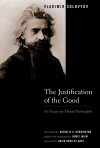
After passing through deism, pantheism, and sundry atheistic visions of life, Vladimir Solovyov emerged as a Christian thinker of irrepressible conviction and uncommon genius. The Justification of the Good, one of Solovyov’s last and most mature works, presents a profound argument for human morality based on the world’s longing for and participation in God’s goodness.
In the first part of the book Solovyov explores humanity’s inner virtues and their full reality in Christ, weaving his moral philosophy with threads drawn from Orthodox theology. In the second part Solovyov discusses the practical implications of Christian goodness for such areas as nationalism, war, economics, legal justice, and family.
This edition of The Justification of the Good reproduces the English edition of 1918 and is the only new publication of this work since that date. The book includes explanatory footnotes by esteemed scholar Boris Jakim and a bibliography, compiled by Jakim, of Solovyov’s major philosophical and religious works.
Jakim has here revised and annotated the nearly century-old translation, which was, stylistically, already lucid and uncompromised. Hart’s brief foreword is perhaps the best theological introduction to Solovyov in English. Their efforts are the perfect complement to a work that is all at once strange, prophetic, and filled with so many brilliant analyses that it is impossible to skim. . . . This is one of those rare books that, if taken seriously, would shake up our disciplinary structures as well as our lives.
—Journal of the American Academy of Religion
Solovyov seems to anticipate and bypass the dead ends of twentieth-century ethical theory, striding confidently ahead into futures thinking before it became a genre. . . . Duddington’s translation flows elegantly and without distraction; Boris Jakim supplies the explanatory footnotes you need; and the foreword by David Bentley Hart has the first-time reader prepared for the surprising experience to follow.
—Reviews in Religion and Theology
The sheer breadth of issues Solyvov examines—from the family to the state, from nationalism to crime and punishment, from war to the economy—makes this book an amazing effort to consider morality in all of its social locations.
—Cistercian Studies Quarterly
Vladimir Solovyov (1853–1900), one of Russia’s leading intellectuals and a close friend of Fyodor Dostoyevsky, taught philosophy at Moscow University. Among his other books is Three Conversations concerning War, Progress, and the End of History.
Boris Jakim is the foremost translator of Russian religious thought into English. His published translations include works by S.L. Frank, Pavel Florensky, Vladimir Solovyov, and Sergius Bulgakov.
Nathalie A. Duddington also translated The Last Days of Tolstoy and The Intuitive Basis of Knowledge: An Epistemological Inquiry.
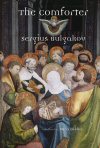
Sergius Bulgakov is widely considered to be the twentieth century’s foremost Orthodox theologian, and his book The Comforter is an utterly comprehensive and profound study of the Holy Spirit.
Encyclopedic in scope, The Comforter explores all aspects of the doctrine of the Holy Spirit, as they are viewed in the Orthodox tradition and throughout church history. The book has sections on the development of the doctrine of the Spirit in early Christianity and on the development of the doctrine of procession in the patristic and later Byzantine periods. It also touches on the place of the Holy Spirit in the Trinity and explores Old and New Testament notions of the Spirit of God. A concluding chapter deals with the mystical revelation of the Holy Spirit. Made available in English through the work of Boris Jakim, today’s premier translator of Russian theology and philosophy into English, Bulgakov’s Comforter in this edition is a major publishing event.
Boris Jakim has offered us an excellent and timely English translation of Sergius Bulgakov’s dense treatise, The Comforter . . . The culmination of Bulgakov’s dogmatic writings, this unique work has an apologetic agenda of restating Christian anthropology and Trinitarian dogma within the framework of the sophiology Bulgakov developed in earlier writings.
—Slavic and East European Journal
The caliber of Bulgakov’s scholarship and the brilliance of his intellectual acumen are both fully evident in The Comforter . . . His writing is steeped in devotional language and holy awe.
—Pneuma
Sergius Bulgakov (1871–1944) is widely regarded as the twentieth century’s leading Orthodox theologian. His books include Relics and Miracles, The Unfading Light, The Burning Bush, The Lamb of God, The Comforter, Jacob’s Ladder, and Churchly Joy.
Boris Jakim is the foremost translator of Russian religious thought into English. His published translations include works by S.L. Frank, Pavel Florensky, Vladimir Solovyov, and Sergius Bulgakov.
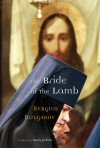
Sergius Bulgakov is thought by many to be the twentieth century’s foremost Russian Orthodox theologian. The Bride of the Lamb is widely regarded as Bulgakov’s magnum opus and, even more, as one of the greatest works ever produced in the modern Orthodox Church. This book is now available in English thanks to esteemed translator Boris Jakim, along with an introduction to Bulgakov and his theological context.
For readers new to Russian religious thought, The Bride of the Lamb presents a fresh approach to Christian doctrine. Bulgakov examines issues of ecclesiology and eschatology from a sophiological perspective. This distinctive Russian approach, based on the doctrine of Sophia, the wisdom of God, sees the creator and creation intimately linked as divine-humanity. The Bride of the Lamb explores the nature of created beings, the relationship between God and the world, the role of the church, and such eschatological themes as the second coming of Jesus, resurrection and judgment, and the afterlife.
Already the most distinguished translator of Russian religious philosophy and theology in the English-speaking world, Boris Jakim has outdone himself with his translation of Bulgakov’s Bride of the Lamb. Drawing on his deep understanding of modern Russian Orthodoxy and masterfully balancing the competing demands of literal and idiomatic translation, Jakim gives us a comprehensible Bulgakov without blunting the visionary enthusiasm and prophetic challenges that make Bulgakov’s theology the wondrous thing that it is. Jakim has made an exceptional contribution to contemporary theological scholarship and ecumenical understanding.
—Paul Valliere, professor of religion, Butler University
Sergius Bulgakov (1871–1944) is widely regarded as the twentieth century’s leading Orthodox theologian. His books include Relics and Miracles, The Unfading Light, The Burning Bush, The Lamb of God, The Comforter, Jacob’s Ladder, and Churchly Joy.
Boris Jakim is the foremost translator of Russian religious thought into English. His published translations include works by S.L. Frank, Pavel Florensky, Vladimir Solovyov, and Sergius Bulgakov.
This title is included in the following collections
You can save when you purchase this product as part of a collection.
Logos 7 Orthodox Gold Legacy L...
$849.99$849.99Logos 9 Orthodox Gold Legacy L...
$849.99$849.99Logos 8 Orthodox Platinum Lega...
$1,499.99$1,499.99Logos 9 Orthodox Platinum Lega...
$1,499.99$1,499.99
- $2,999.99
- $2,999.99
- $4,512.95$3,599.99
- $11,399.99
- $21,749.99
- $24,999.99
- $37,403.33$27,999.99
Reviews
2 ratings

Terry Speak
7/28/2023

Chrisj
5/11/2016
Unworthy as I am and If I can be so bold as to suggest that Fr. Thomas Hopko was always about the Orthodox listening/studying and making informed decisions. He'd often give a talk and let the people decide if what he said was "Orthodox." I've taken that into consideration when I've read/heard other Orthodox books/talks, etc. In his forward, found in the Orthodox Church (by Bulgakov), Father Thomas Hopko states: ...Those who are serious in their seekings, whether their theological and spiritual convictions, are obligated at some point to come to terms with Fr Sergius Bulgakov. The results for the courageous cannot fail to be enlightening and inspiring: perhaps not in the ways that the Russian thinker imagined but in ways known to the Master he served..." While one may be labeled as a heretic, not all their work is heretical. If SVS Press and Fr. Tom endorse some of his works, I would think that we should tread carefully in our readings of any works, whether by Bulgakov or any author for that matter. Rhonda's caution should be strongly heeded if you decide to purchase, but be sure to compare his teachings to other teachings of the Church. Any heresy should become obvious. Please forgive me!
Rhonda Dodson
11/28/2014
This collection is very prominent with texts by Sergius Bulgakov. All but 3 were written by him. Bulgakov was condemned by the Russian Orthodox Church as a heretic for the heresy of sophianism (uniting together of the Holy Spirit and the Virgin Mary into a single deity or hypostasis of God). Therefore, I cannot recommend this set, especially for those unfamiliar with Eastern Orthodoxy.